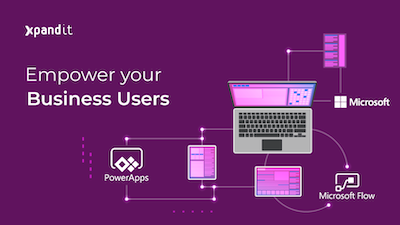We live in a world in which mobility is ubiquitous: there are, at this point in time, apps for whatever action we need to complete at any given moment of our lives. The majority of those apps are built with the consumer in mind and ideally, it is this end user that companies are thinking of when designing and building their digital solution. However, mobile applications are not only useful for the general public. Mobile apps, in a business context, can be critical to managing a company’s daily activities.
Business apps, as they are commonly called, are specifically designed to solve a problem within an organization. In that sense, these apps offer the possibility for companies to manage part of their business in a faster, more efficient and more productive way. However, not all business apps justify the time and investment that is required for a custom development tailored to the needs of each and every company. Since companies have to contend with budget constraints as well as time and human resources limitations, it might seem like a distant dream building an app that can suppress internal needs of efficiency and effectiveness for processes that have the potential to be automated.
Taking advantage of the entire Microsoft ecosystem, which is present in many organizations, it is possible to build an app with Microsoft PowerApps. From an internal point of view, PowerApps have a considerable impact on business processes – they can be dematerialized and, consequently, it is possible to increase productivity and reduce inefficiencies.
On the other hand, with Microsoft PowerApps, you can enable everyone – even people with no programming or coding skills – within the organization to create and maintain the application. Additionally, Microsoft Power Automate – a tool that complements Microsoft PowerApps – helps automate processes in different applications and services, whether it is requests’ approval, fulfilment of certain conditions (actions to be followed in case the answer is yes or no), automation of repetitive processes, etc.
In this way, these digital solutions will not depend exclusively on the IT Department and these power users, who already have the business knowledge – and guaranteeing that they are equipped with the necessary knowledge to use these tools – will be able to sustain an effective solution, based on Microsoft infrastructure, without the need of programming knowledge. Moreover, with Office 365, data circulates naturally, rather than generating silos of information which create entropies and inefficiencies. Therefore, your app is always kept up to date with real-time data.
Practical scenario: automating vacations approval
The vacations approval process is a great use case of these tools: you can automate the whole process where the first step is building a vacation request form that the employee submits for approval. Secondly, the manager receives a push notification on his mobile, in which he can immediately approve the request. The process is finished by sending an automatic email to the employee letting him know that his request has been approved. In just a few steps, we are able to automate the process that was previously dependent of the HR department. With these tools available, we can quickly go from conceptualization to execution and in just a few minutes the employee can start planning his dream vacation instead of despairing while thinking that it will take several weeks for his request to be approved. Like this example, there are many other different use cases for Microsoft PowerApps and Microsoft Power Automate – these tools are a tailored solution, fully adaptable to the singular reality of your company.
Xpand IT experience with PowerApps
Xpand IT has been working with Microsoft PowerApps and Microsoft Power Automate since the first stages of these products’ development. As such, we recognized from the outset that these technologies could complement our own mobile development solutions, whether in cross-platform (Xamarin) or native development. In our point of view, in the context of business apps, PowerApps has an interesting value proposition not only because of the shorter time-to-market but also for allowing business users to materialize their vision in a useful tool – a tool that might justify, in the future, the development of new versions or the recourse to other technologies. For every problem there are many different solutions and we consider Microsoft PowerApps a very interesting tool to boost digital transformation in organizations.

Digital Xperience Evangelist – Xpand IT











